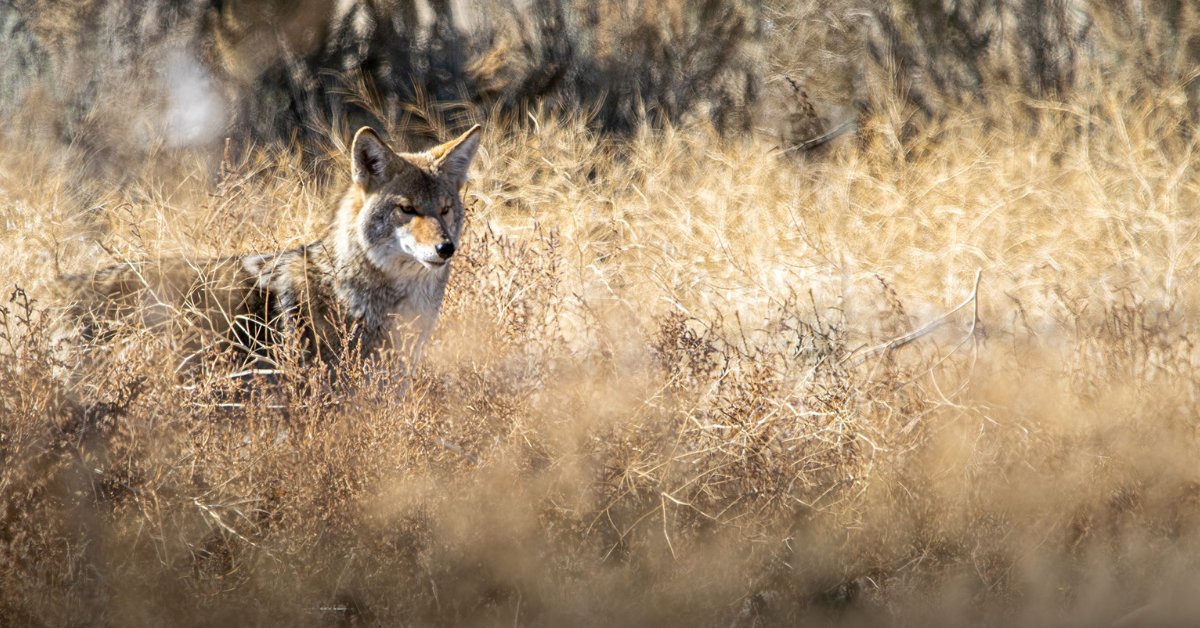Coyotes are an important part of our ecosystem and contribute to a necessary and healthy prey-predator balance. As our population expands, we encroach upon the natural habitats of various wild creatures, causing them to adjust to new surroundings and settle near us.
You can stay safe and help prevent conflict with them by:
- Keeping your distance
- Never feeding them
- Keeping pets away from them
- Making loud noises and waving arms if approached
Report a Sighting
You can report a sighting to Animal Services at 905-655-0283 or using the online reporting form.
Coyote Sightings Dashboard
Learn more about Whitby's latest coyote sightings using this dashboard.
Do not feed coyotes
Giving food to coyotes makes them less scared of people, and that's not good because it's important for humans and coyotes to be able to live near each other safely. Often when aggressive coyotes are reported in a neighborhood it is because someone in the area has fed them. This could lead to them attacking small pets or children. Feeding coyotes is not permitted under the Town’s Public Nuisance By-law.
Community members can eliminate the food source by:
- securing your garbage
- keeping people and pet food indoors
- cleaning up fallen fruit and spilled bird seed
Frequently Asked Questions
How can I prevent coyotes from visiting my yard?
- Keep your property clean - trim back bushes and weeds, scoop your dog poop, and keep your barbeque area clean.
- Secure your home and sheds - seal openings into and under buildings, decks, and porches.
- Consider the installation of motion sensor lights.
- Human indifference is not an appropriate response to a coyote getting comfortable around areas people frequent. Never allow a coyote to linger or bed down near your home or business.
How can I keep my pets safe?
Here is how you can be a good pet owner and keep your pets safe:
- Supervise pets when they are outdoors at all times
- Bring pets in at night
- Keep dogs on a leash no longer than 6 feet in length
- Retractable-type leashes are not recommended
What should I do if I encounter a coyote?
- If you feel your safety is imminently threatened, call 9-1-1.
- Stop and pick up small children and pets.
- Slowly back away, keeping an eye on the animal. Never run from or turn your back on a coyote.
- Be big, loud, and assertive! Yell, "Go away!"
- Wave your arms above your head.
- Use aversion techniques such as shaking car keys, snapping a large air-filled garbage bag, popping an umbrella, and throwing an object in the direction of, but not directly at, the coyote.
How do I report coyote sightings?
When will I see coyotes more frequently?
Coyote sightings are more frequent in the Winter during mating periods (January - February), Spring during den selection/pup rearing (March - June) and Fall during the dispersal of pack members.
If you are looking for more ways to learn and understand Coyote behaviour and how to protect you and your property, please visit the Ontario Ministry website to learn more about how you can avoid conflicts with coyotes; Preventing & Managing Conflicts with Coyotes, Wolves & Foxes.
To help prevent conflict with coyotes, the Town does the following:
- Responds to Coyote sightings.
- Is implanting improvements to our tracking system to provide better data on the types of interactions and encounters community members are experiencing.
- To help prevent conflict with coyotes, the Town does the following: ows best practices from Coyote Response Management Plans developed in partnership with other municipalities and consults with other municipalities that have coyote response strategies. .
- Installs “Coyote Warning” signage in areas where multiple Coyote sightings have been reported.
- consulting with other municipalities who have coyote response strategies
- consulting Consults with the Ministry of Northern Development, Mines, Natural Resources and Forestry to obtain information on response best practices and request their assistance as needed.
- Consults with Coyote Watch Canada on response best practices.
- Are working with the Durham Regional Police Service on their coyote response approach
Resources
Follow @TownofWhitby on Facebook or Twitter for news and safety tips.
• Free Coyotes in the Urban Landscape online module
• Coyote Watch Canada information, including Frequently Asked Questions
• Ministry of Natural Resources





